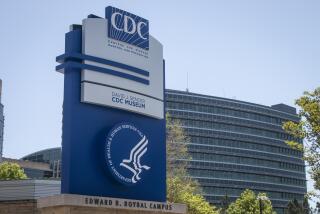County OKs Extending Funds for AIDS Drug Program : Health: $700,000 in state grants will be used to give AZT and other medication to low-income residents.
- Share via
SANTA ANA — The county Board of Supervisors accepted more than $700,000 in state grants Tuesday to extend a program that provides the controversial drug azidothymidine--AZT--to low-income residents with AIDS or AIDS-related illnesses.
The new funding will extend the drug distribution program through September and pay for 13 new drugs that will be added to the list of medications made available to poor residents with HIV or AIDS.
“Patients all across the county are grateful for the state AIDS drug program,” said Dr. Jody Meador, the county’s HIV medical director. “A lot of insurance plans don’t have prescription coverage or a deductible or make it very difficult for anybody to access expensive medication on a regular basis.”
The program, administered by the state Department of Health Services, has allocated more than $2.4 million to AIDS-fighting drugs to Orange County since 1992. Meador said the available medications treat the complications of HIV infections and are used in an attempt to halt or slow the AIDS virus.
Eligible patients receive an identification card after showing county officials they have no means to pay for required treatments. The special identification allows patients to fill their physicians’ prescriptions at Sav-On pharmacies without charge.
To receive the drug at no cost, patients must earn $29,444 or less annually. Patients who earn $29,445 to $50,000 are placed on a sliding-scale payment plan.
The state program is “a wonderful service,” Meador said. “When you get into the later stages of the disease, the medications can run thousands of dollars a month.”
State funding for AIDS treatment for the poor began in 1987 with AZT and today there are 26 drugs, including AZT, available through the state program. The effectiveness of AZT is a subject of debate among researchers.
Dr. Robert Taylor, the county’s manager of sexually transmitted diseases and HIV services, said about 200 new patients were approved to receive the drugs in Orange County last year. A total of about 1,500 patients receive the drug assistance annually.
AZT is the most widely prescribed anti-AIDS drug. Several studies have shown that taking AZT after infection but before the onset of symptoms delays progression of the disease. But a study presented last year at the international AIDS conference in Berlin questioned the long-term benefits of the drug’s use.
The study, known as Concorde, showed that patients who took AZT early lived no longer than those who used the drug after developing the symptoms of AIDS.
Dr. Peter Kerndt, director of Los Angeles County’s HIV epidemiology program, said the drug’s availability through the state program has been “better than having nothing at all.”
“The exact efficacy of the drug is a matter of debate,” Kerndt said, “but I would be taking the drug if I was HIV-positive.”
Priscilla Munro, executive director of Orange County’s AIDS Services Foundation, said hundreds of the foundation’s 611 clients use AZT and many have reported various successes.
“AZT still has its place in the armament,” Munro said. “It still is a first-line drug.”
More to Read
Sign up for Essential California
The most important California stories and recommendations in your inbox every morning.
You may occasionally receive promotional content from the Los Angeles Times.













